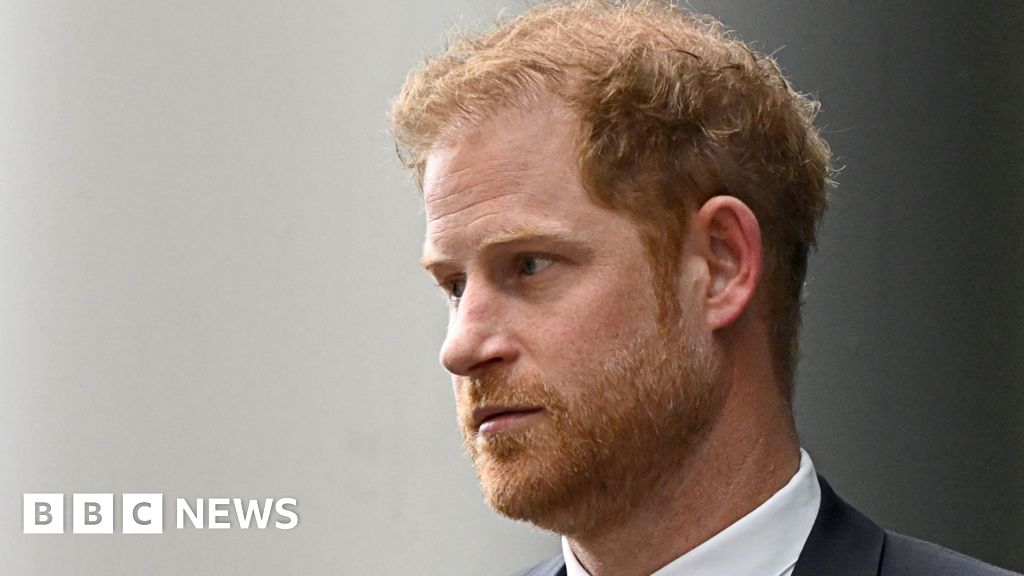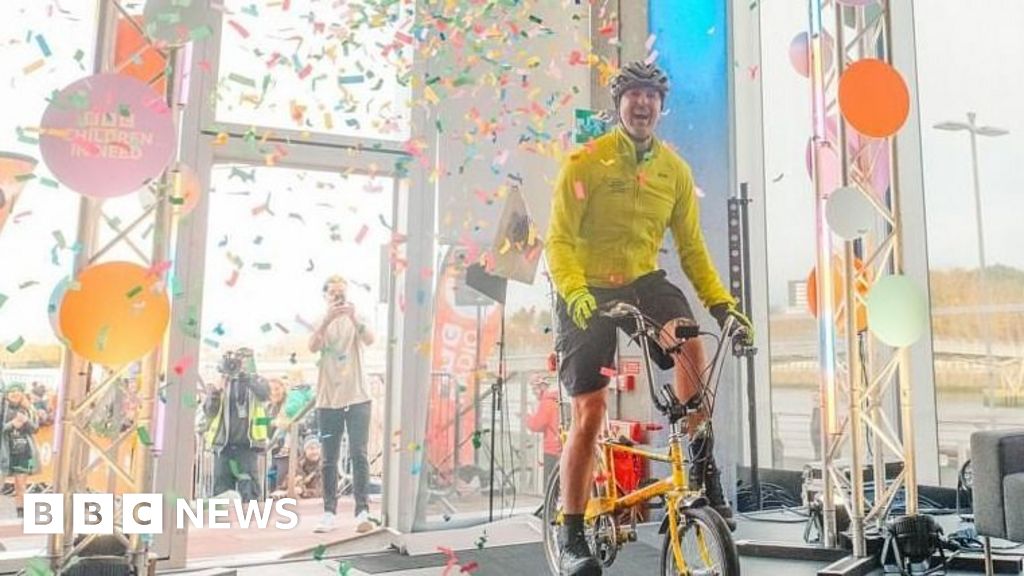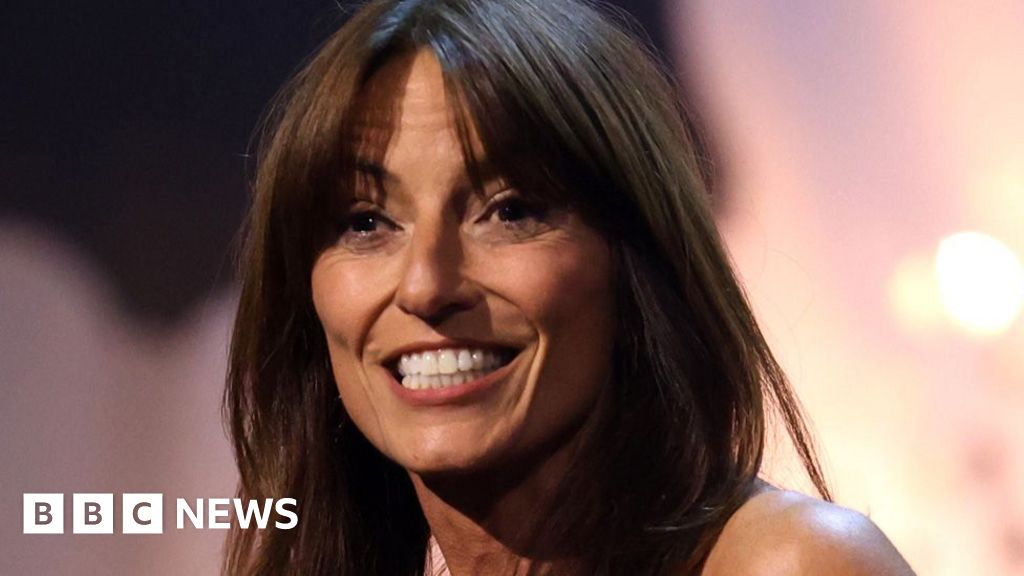ARTICLE AD BOX
By Mark Savage
BBC Music Correspondent
Image source, Tears For Fears
Image caption,The Tipping Point is Tears For Fears' first album of new material since 2004
One of the biggest bands of the 1980s, Tears For Fears could score their first number one album in 33 years on Friday.
The Tipping Point is currently locked in a battle for the top spot with rapper Central Cee's 23, with about 1,100 sales separating the two acts.
If it holds on, it will crown a triumphant return for a band who have survived acrimonious break-ups and personal tragedy in the last 30 years.
Even this album hung in the balance, taking "seven years" to complete.
"We had a false dawn back in 2016," explains Roland Orzabal, the band's chief songwriter and joint vocalist.
"There was a lack of trust from our management and the record company. 'Can you guys make a record nowadays? Do you even know how?'
"So we ended up working with teams of songwriters, which was very, very strange. It was almost harking back to the Tin Pan Alley days, where no-one trusted you to do your own thing. It had to go through the filter of younger, successful songwriters.
"So we ended up with a record, half of which we liked, but half of which we didn't like."
Warning: Third party content may contain adverts
Lockdown gave them the opportunity to pause and reflect on the recording sessions. Curt Smith's feeling was that the album was cluttered and unfocused.
"What we lacked was an overview of what the subject matter should be. And we were left with this album that was 12 attempts at doing one single thing." (That thing being "the mythical hit single", Orzabal explains.)
So they shut everyone else out and went back to the writing style they'd practiced in their early days, in the Snow Hill council estate in Bath.
"I'd come round to Curt's house with a tape recorder and we'd just muck about," says Orzabal. "A voice in the back of my head said, 'Curt is going to provide the key to finishing the album'. So we sat together and, within an hour, Curt started fiddling with this country riff and we were off."
That quiet, finger-picked riff was the polar opposite of what they'd been working on in the studio. It became the album's opening song, No Small Thing, expanding and unfolding into a "crazy Beatles-type ending", full of pounding drums and orchestral swells.
Warning: Third party content may contain adverts
More songs soon followed - Master Plan (a dig at record label interference), Break The Man (a plea for female equality) and the title track, a lament for Orzabal's wife, Caroline, who died in 2017 after a long struggle with depression and alcoholism.
The band discussed those songs and more in a series of interviews with the BBC.
There was a period in the 1990s where neither of you spoke to each other. How did you reconnect? Who called who?
Roland: We actually reconnected by fax, so it was the reverse of Phil Collins' divorce.
He [Kurt] sent the message and it popped up on the printer, saying, 'Look, here's my number. It's been nine years, give me a call.' I was like, 'Should I? Should I not?' But eventually I called him and we had this conversation. By this time, Kurt's been living in America so he's got this mid-Atlantic way of talking - he's talking about 'inspiration' and 'motivation' and 'direction'. I mean, this is a kid from the Snow Hill Flats in Bath.
Kurt: I don't think I used those words
Roland: He can't remember.
So you'd changed a bit but clearly you still have a connection?
Roland: We do, definitely without question. We've been working on this new album for seven years now. It's a long, long time.
Backstage at Top of the Pops in 1982. The band would go on to have worldwide hits such as Shout and Sowing The Seeds Of Love
Why is it called The Tipping Point?
Curt: We felt the world was very much at a tipping point. The rise of the right wing, Trump being elected, the Black Lives Matter movement, the pandemic, the climate crisis… And I think, for us, going through this experience together was a tipping point personally because there were so many false starts. The fact that we did, it seemed like an apt title for us.
Roland: The tipping point in the title track is a little bit more private and a bit morbid - because the narrator [in that song] is in a hospital ward looking at someone they've loved for a long time, knowing that they're going to die, watching their breath, looking at them and just wondering at what point are they going to pass from life into death.
That was based on a very difficult time in your personal life. You lost your wife during the recording of the album, and you'd known each other since you were teenagers.
Roland: Yeah, we were all 13 and 14 - myself, Curt and Caroline and a couple of other people hanging around this council estate in Bath, drinking flagons of cider. We'd known each other since we were kids, so there was a hugely strong bond there, and this real sense of each other - even as we grew up and changed and got money. So it was a fantastical, at times painful, relationship.
Warning: Third party content may contain adverts
You've described My Demons as a song that could have been written for Depeche Mode.
Roland: We love Depeche Mode a lot and we were slightly jealous of them.
Curt: They were always going to be cooler than us.
Roland: I remember, we'd already had some hits with our debut album, The Hurting in 1983 or 84, and I was watching Top of The Pops in the first house I'd bought in Bath, when Depeche Mode came on with Everything Counts. I just thought, 'What is the point in us making another record?' I was just devastated. I was depressed. I was in tears.
A year later, we were number one in the states with Shout, and it just goes to show what you go through, artistically. But yeah, My Demons, is a bit of a hook back into that era. And we've been joking - I do a pretty good vocal but it was almost built for Dave Gahan from Depeche Mode.
Warning: Third party content may contain adverts
Last year, you won an Ivor Novello Award for "outstanding song collection". What did that mean to you?
Roland: It was a huge honour. And what's nice is the award is for the songs and not for us as young pop stars, which we certainly aren't any more.
Which is the song that follows you around the most?
Curt: Everybody Wants To Rule The World and Mad World, those are the two.
Roland: It has to have 'world' in the title.
Curt: We don't have anything called world on this album.
Roland: We'll have to change it again.
What did you make of the Michael Andrews and Gary Jules version of Mad World?
Roland: Well, it was a shock to me, to actually listen to those lyrics exposed, without being hidden behind that electronic arrangement. It sent shivers up my spine.
Kurt: The first time I heard it was on American radio and I thought it was Michael Stipe. But what is really gratifying is versions of songs like that one, and Lorde's version of Everybody Wants to Rule The World, is that really bring a different interpretation of the song. And in some ways, their production is almost more in tune with the lyrics than our versions were.
How do you feel the new album compares to those classics?
Curt: We feel like this is some of the best work we've ever done. The looks we gave each other at the end of recording - we both we knew we had something really good, which is the best feeling you can get as a musician.
Tears For Fears were speaking to BBC music correspondent Mark Savage; Samira Ahmed on BBC Radio 4's Front Row; and Charlie Stayt and Naga Munchetty on BBC Breakfast.
Follow us on Facebook, or on Twitter @BBCNewsEnts. If you have a story suggestion email entertainment.news@bbc.co.uk.

 2 years ago
32
2 years ago
32








 English (US)
English (US)